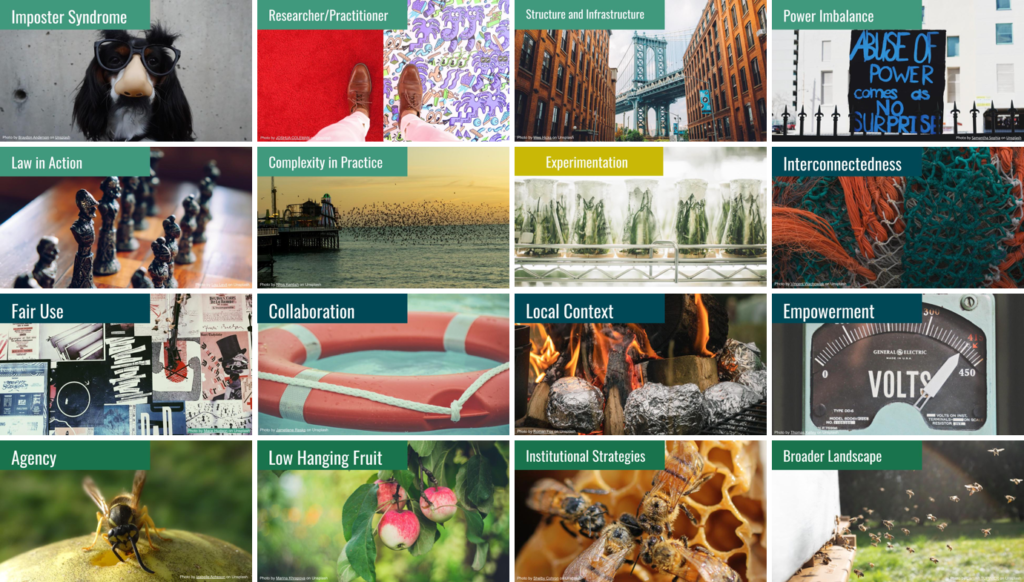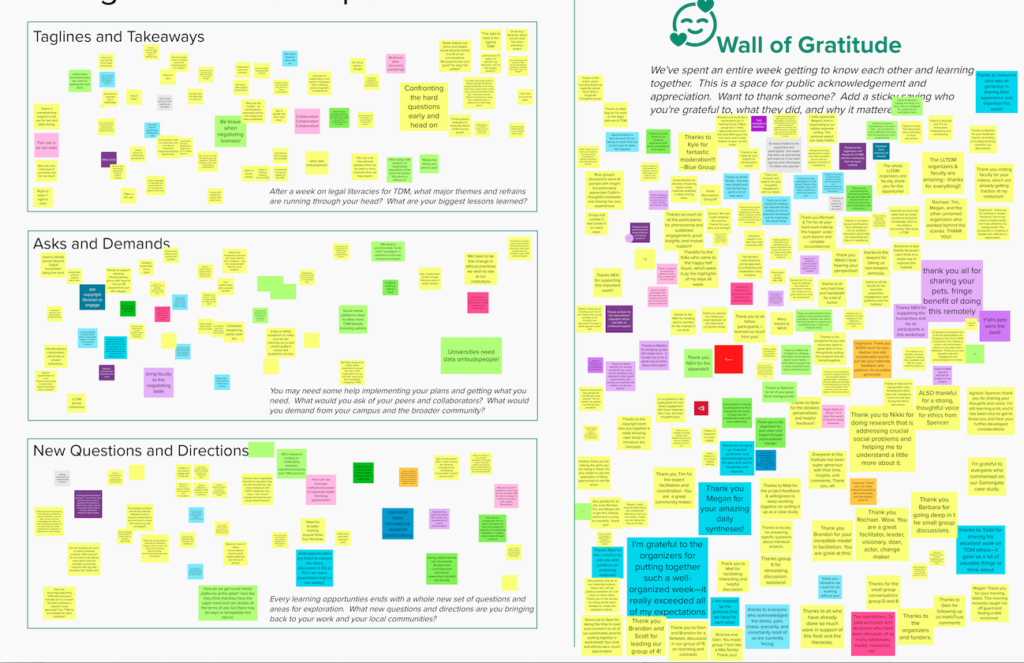
This update is cross-posted from the Building LLTDM blog.
On June 23-26, we welcomed 32 digital humanities (DH) researchers and professionals to the Building Legal Literacies for Text Data Mining (Building LLTDM) Institute. Our goal was to empower DH researchers, librarians, and professional staff to confidently navigate law, policy, ethics, and risk within digital humanities text data mining (TDM) projects—so they can more easily engage in this type of research and contribute to the further advancement of knowledge. We were joined by a stellar group of faculty to teach and mentor participants. Building LLTDM is supported by a grant from the National Endowment for the Humanities.
Why was the Institute needed?
Until now, humanities researchers conducting text data mining in the U.S. have had to maneuver through a thicket of legal issues without much guidance or assistance. As an example, take a researcher scraping content about Egyptian artifacts from online sites or databases, or downloading videos about Egyptian tomb excavations, in order to conduct automated analysis about religion or philosophy. The researcher then shares these content-rich data sets with others to encourage research reproducibility or enable other researchers to query the data sets with new questions. This kind of work can raise issues of copyright, contract, and privacy law. It can also raise concerns around ethics, for example, if there are plausible risks of exploitation of people, natural or cultural resources, or indigenous knowledge.
Potential law and policy hurdles do not just deter text data mining research: They also bias it toward particular topics and sources of data. In response to confusion over copyright, website terms of use, and other perceived legal roadblocks, some digital humanities researchers have gravitated to low-friction research questions and texts to avoid making decisions about rights-protected data. When researchers limit their research to such sources, it is inevitably skewed, leaving important questions unanswered, and rendering resulting findings less broadly applicable.
Moving an interactive, design-thinking Institute online
After months of preparation, we had been looking forward to working and learning together at UC Berkeley, but the world had other plans for our Institute. Due to the global health crisis, we had to transform our planned in-person, intensive workshop into an interactive and relevant remote experience.
How did we do this? The pandemic meant we had to transition everything online, which of course presents challenges for a design-thinking framework. We are thrilled that our approach to interactive remote pedagogy was successful! (You can check out the schedule and framework in our Participant Packet.) The substantive content was pre-recorded and delivered in a flipped classroom model. Faculty created a series of short videos, and shared readings relevant to the legal literacies. We also provided the video transcripts and slides to participants to promote accessibility and accommodate multiple learning styles.
We used Zoom to meet synchronously for discussion in groups of various sizes. We used Slack for asynchronous communication, and interactive tools such as Mural for design thinking exercises like journey mapping so that everyone could live edit and collaborate. We capped each day with a “happy half hour” on Zoom as an informal way to get to know each other a little better, even from afar.
We also relied on an institute moderator and daily writing exercises to reinforce the design-thinking stages and learning outcomes. Each night, we reviewed the participants’ free-writes and began the next morning by reflecting back to the participants the themes from what they had shared.

Reflections on goals: social justice & effective empowerment
One of our priorities for the Institute was to invite a diverse pool of participants, including those involved in social justice research, in order to maximize the public value impact of Building LLTDM. We looked for demonstrated commitments to diversity and equity but could hardly have imagined the breadth and depth of experiences that applicants were willing to share. The selected participants research everything from understanding “place” data from community histories of historic African American settlements to the development of AIDS activist networks in communities of color; to portrayals of autism in literature; and more. Others demonstrated a commitment to bringing back the skills they learn to expand TDM opportunities for students and communities who have traditionally been marginalized or under-resourced. They also came from a variety of institution types, from research advising and support experience, professional roles, levels of experience with TDM, career stages, and disciplinary perspectives.
We are also moved by the participants’ own reflections on the experience. One of the last interactive exercises we hosted during the online Institute was a collective week-in-review discussion, and gratitude wall. We asked the participants to share what they were thankful for, highlighting other participants where possible. So many of the participants wrote about how valuable the learning experience was and how thoughtfully it was put together and delivered.

We can’t express the transformational impact of the week better than the participants, themselves. In Institute evaluation forms, they shared feelings like:
- “This is by far the best organized event that I have ever attended. The content was by far the most substantive. The faculty were by far the most engaged. A+ across the board.”
- “I am so grateful to have had the opportunity to engage with a diverse group of scholars (researchers and professionals)… The deliberately thought through breakdown and mix fostered incredibly valuable discussions and I would hope this kind of framework is used as a best practice for future DH institutes of all kinds going forward. Also, thank you for such an amazing virtual experience which I can only imagine took a tremendous amount of work to coordinate and plan with limited time to shift to an entirely different format–I was overjoyed to critically engage with complex subjects…”
- “This has been phenomenal. I don’t want to qualify it (by adding something like “…for having to be moved online”), because it’s been so, so good: well organized, thoughtful, and human throughout.”
- “There was clearly so much thought, care, and planning that went into the preparation of this institute, and it was an amazing opportunity to learn from a group of people — organizers, faculty, and participants — who all have such deep expertise. The video and readings lists alone are a huge resource, but to be able to process and reflect on that material together with a diverse group of people was really wonderful.”
Next steps, and our own gratitude
What’s next for Building LLTDM? The “Institute” is not over yet; only the 1-week training is complete. The cohort will be meeting again virtually in February 2021 to discuss how implementation of the literacies into our local communities and practices has gone. In the meantime, as the participants bring back the law and policy literacies they’ve learned to their home institutions, we are excited to see several cohort members already organizing their own post-Institute research subgroups, such as those whose TDM work relies heavily on social media content, and others who are exploring how to disseminate the Building LLTDM literacies within other instructional formats and frameworks.
As part of the grant, the project team will also be aggregating the resources from the Institute and developing supplementary material for an Open Educational Resource (OER). We know there is a large community of TDM researchers and professionals who may be interested in or who can benefit from these materials, and the OER will be made available for broad reuse in the public domain.
Thank you to all the participants for their insights and contributions, willingness to share, and flexibility in transitioning to a fully-remote Institute. Thank you to all the faculty for their unmatched legal and policy expertise, ongoing commitment to mentorship, and adaptability in content creation and delivery. And thank you again to the NEH for making such a meaningful experience possible.